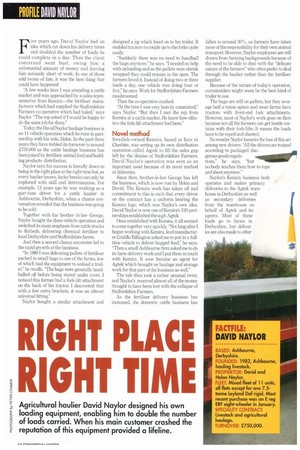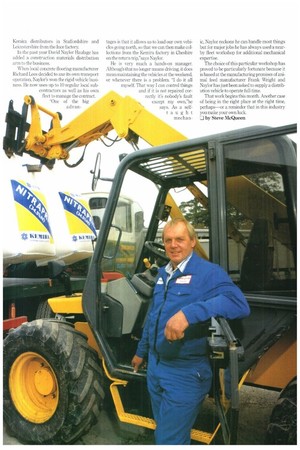RIGHT PLAC
Page 46

Page 47

If you've noticed an error in this article please click here to report it so we can fix it.
!RIGHT TIM
Agricultural haulier David Naylor designed his own loading equipment, enabling him to double the number of loads carried. When his main customer crashed the 2 reputation of this equipment provided a lifeline.
Five years ago, David Naylor had an idea which cut down his delivery times and doubled the number of loads he could complete in a day. Then the client concerned went bust, owing him a substantial amount of money and leaving him seriously short of work. In one of those odd twists of fate, it was the best thing that could have happened.
"A few weeks later I was attending a cattle market and was approached by a sales representative from Kemira—the fertiliser manufacturer which had supplied the Staffordshire Farmers co-operative which had failed," says Naylor. "The rep asked if I would be happy to do the same job for them."
Today, the David Naylor haulage business is an 11-vehicle operation which he runs in partnership with his wife, Helen. In the past three years they have trebled its turnover to around £750,000 as the cattle haulage business has been joined by fertiliser, animal feed and building products distribution.
Naylor says his success is literally down to being in the right place at the right time but, as every haulier knows, lucky breaks can only be exploited with skill and determination. For example, 13 years ago he was working as a part-time driver for a cattle haulier in Ashbourne, Derbyshire, when a chance conversation revealed that the business was going to be sold.
Together with his brother in-law George, Naylor bought the three-vehicle operation and switched its main emphasis from cattle trucks to flatbeds, delivering chemical fertiliser to local Derbyshire and Staffordshire farms.
And then a second chance encounter led to the rapid growth of the business.
"In 19891 was delivering pallets of fertiliser packed in small bags to one of the farms, few of which had the equipment to unload a trailer," he recalls. "The bags were generally handballed off before being stored under cover. I noticed this farmer had a fork-lift attachment on the back of his tractor. I discovered that with a few extra brackets, it was an almost universal fitting."
Naylor bought a similar attachment and designed a jig which fixed on to his trailer. It enabled tractors to couple up to the forks quite easily.
"Suddenly there was no need to handball the bags anymore," he says. "I needed no help with unloading and as the pallets were shrink wrapped they could remain in the open. The farmers loved it. Instead of doing two or three loads a day, one vehicle was doing four or five," he says. Work for Staffordshire Farmers mushroomed.
Then the co-operative crashed.
"At the time I was very heavily committed," says Naylor. "But then I met the rep from Kemira at a cattle market. He knew how effective the fork-lift attachment had been."
Novel method
Swedish-owned Kemira, based at Ince in Cheshire, was setting up its own distribution operation called Agtek to fill the sales gap left by the demise of Staffordshire Farmers. David Naylor's operation was seen as an important asset because of its novel method of deliveries.
Since then, brother-in-law George has left the business, which is now run by Helen and David. The Kemira work has taken off and commitment to this is such that every driver on the contract has a uniform bearing the Kemira logo, which was Naylor's own idea. David Naylor is now one of Ketnira's 150 partnerships established through Agtek.
Once established with Kemira, it all seemed to come together very quickly. "Not long after I began working with Kemira, feed manufacturer Criddle Billington asked me to put in a fulltime vehicle to deliver bagged feed," he says. "Then a small Ashbourne firm asked me to do its farm delivery work and I put them in touch with Kemira. It soon became an agent for Agtek which brought us haulage and storage work for that part of the business as well."
The tale then took a rather unusual twist, and Naylor's received almost all of the money thought to have been lost with the collapse of Staffordshire Farmers.
As the fertiliser delivery business has increased, the domestic cattle business has fallen to around 30%, as farmers have taken more of the responsibility for their own animal transport. However, Naylor employees are still drawn from farming backgrounds because of the need to be able to deal with the "delicate nature of the farmers" who often prefer to deal through the haulier rather than the fertiliser supplier.
Because of the nature of today's operation, curtainsiders might seem be the best kind of trailer to use.
The bags are still on pallets, but they average half a tonne apiece and most farms have tractors with front-end fork attachments. However, most of Naylor's work goes on flats because not all the farmers can get inside curtains with their fork-lifts. It means the loads have to be roped and sheeted.
No wonder Naylor laments the loss of this art among new drivers: 'All the drivers are trained according to packaged clan gerous goods regula tions," he says. "but no-body teaches them how to rope and sheet anymore."
Naylor's Kemira business both operates and makes primary deliveries to the Agtek ware house in Derbyshire as well as secondary deliveries from the warehouse on behalf of Agtek and its agents. Most of these loads go to farms in Derbyshire, but deliver ies are also made to other Kemira distributors in Staffordshire and Leicestershire from the Ince factory.
In the past year David Naylor Haulage has added a construction materials distribution arm to the business.
When local concrete flooring manufacturer Richard Lees decided to axe its own transport operation, Naylor 's won the rigid vehicle business. He now uses up to 10 regular local subcontractors as well as his own fleet to manage the contract. One of the big advan
tages is that it allows us to load our own vehicles going north, so that we can then make collections from the Kemira factory in Cheshire on the return trip,"says Naylor.
He is very much a hands-on manager. Although that no longer means driving, it does mean maintaining the vehicles at the weekend, or whenever there is a problem. "I do it all myself. That way I can control things and if it is not repaired correctly it's nobody's fault except my own,"he says. As a selftaught mechan
ic, Naylor reckons he can handle most things but for major jobs he has always used a nearby fleet workshop for additional mechanical expertise.
The choice of this particular workshop has proved to be particularly fortunate because it is based at the manufacturing premises of animal feed manufacturer Frank Wright and Naylor has just been asked to supply a distribution vehicle to operate full-time.
That work begins this month. Another case of being in the right place at the right time, perhaps—or a reminder that in this industry YOU make your own luck.
by Steve McQueen




































































































